¶ THESE DAYS I WRITE IN SUBSTACK (for email sub and convenience):
LINK: https://storyofthecollective.substack.com/
¶ the “Borrowing from others and giving it your own twist”
Hip-hop popularized sampling old songs to produce something new. While criticized by “real” musicians, I think it is a fantastic way of building novel concepts. You take samples from one song, maybe borrow more from another, you put them together, connect them and now you have a new concept which is the new song born out of these recycled components. It has a new taste, a new flavor. The original song did not have the twist you gave to it. Your song is not ripped off, it has new characteristics!
In incremental reading, you have tons of articles in your learning queue, of which many typically are redundant. You have articles on some specific domain from author A, B and C. It would be foolish to listen to only one voice. Instead, you take the insights from different authors, evaluate the evidence and come to your own conclusion.
It takes a thousand men to invent a telegraph, or a steam engine, or a telephone or any other important thing - and the last man gets the credit and we forget the others. He added his little mite - that is all he did. These object lessons should teach us that ninety-nine parts of all things that proceed from the intellect are plagiarisms, pure and simple; and the lesson ought to make us modest. But nothing can do that. — Mark Twain (to Helen Keller)
In context of human relationships, they say that you are the sum of the 5 closest people to you. We unconsciously mimic behavior of our close friends. We take some traits they have and integrate it into our own character. The funny way you greet people, is now something I do to others. It is part of my character now. It has my twist.
See this scene from the wolf of wall street of Anthony Bourdain explaining CDOs:
“It’s not old fish, it’s a whole new thing!”
The Big Short: Anthony Bourdain explains CDO
https://www.youtube.com/watch?v=kxN_qPuefrM
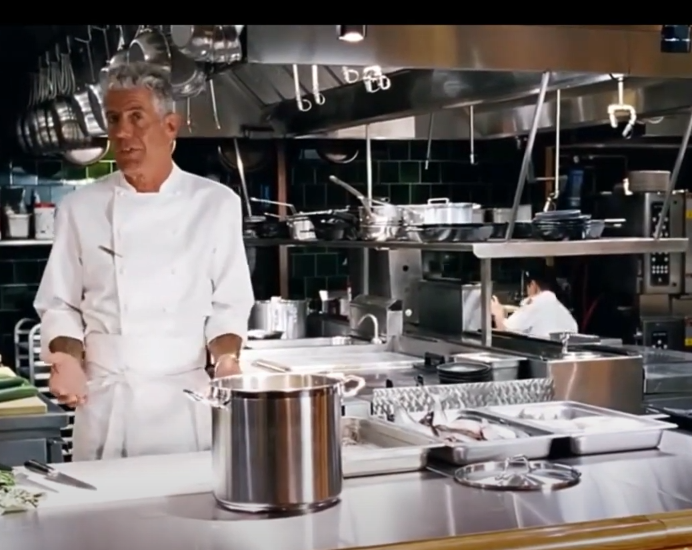
Netflix is a platform that took existing things, put them together and now you have a new thing that is platform to stream movies and TV-shows. This might be more extreme example and extends to basically every platform there is, but it is true. They’re taking something old and giving it a new twist, even if that new is centralizing it.
Now even more extreme point is that there is no 100% original idea, everything is born out of some existing components. No matter how abstract and unprecedented your idea is, it is born out of something that already is. No matter whether that something is some really weird association in your head that you think doesn’t exist anywhere else in the world. That association is born out of some memories that were born of something that already is.
Moral of the story: Being original is good, but literally everything follows from something and everybody gets influence from somewhere. Don’t be ashamed to follow up on existing idea, you give it new characteristics, it is new value. Without mp3 players there wouldn’t be iPod.

23.03.2021
¶ Your life needs the edge of chaos
This is a big idea that we can all benefit from, the edge of chaos has huge implications. It is a transition space between order and disorder, it is where the truly creative changes occur in our lives. We love order, stability and we hate anything and anyone that disturbs our lovely orderliness. It is a shock to our system. However…
Not much grows in the order zone (or comfort zone), it is smooth sailing, things are OK and that is fine. On the other hand, we also look to make the best out of our lives and this is kind of a conflict, a perpetual problem as the absolute best, things above the average usually requires a big shake-up and this fights against our love for order.
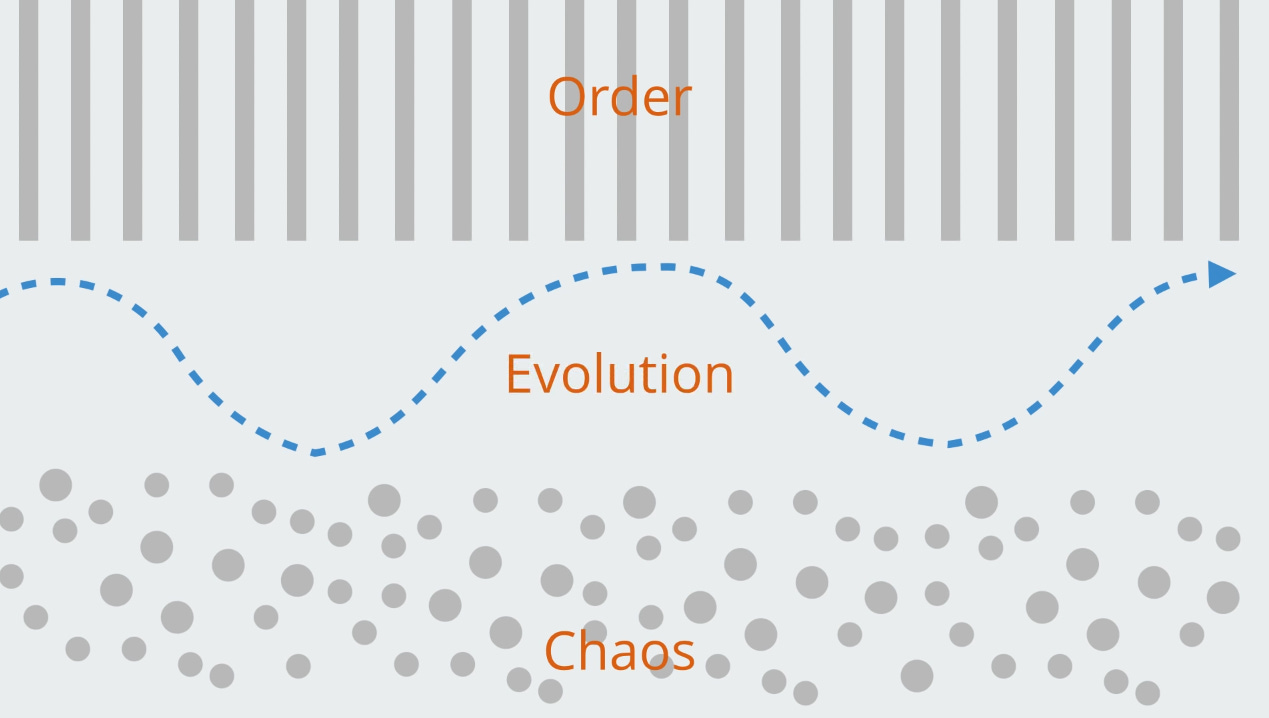
“The truly creative changes and the big shifts occur right at the edge of chaos,” said Dr. Robert Bilder, a psychiatry and psychology professor at UCLA’s Semel Institute for Neuroscience and Human Behavior.
If there is no order, you will die
Historically speaking, if we did not have order it would mean death, if we did not have our tribe we would die in the wilderness. Uncertain could kill us and this discomfort for uncertainty manifests itself everywhere in our lives.
There is something called uncertainty reduction theory where whenever we meet a stranger we find ways to reduce uncertainty about him. Whether that is by having a small talk, unconsciously picking clues about the body language he uses, the way he talks and such. This is because people new to us, unless proven otherwise are a threat and could kill us. It is our defense mechanism to survive in the wilderness.
The edge of chaos requires us being comfortable with uncertainty, it requires us to navigate uncertainty. Having a divorce is dangerous, it means we are going to face something unknown, not good. Getting fired, having a huge debt means you might lose your house, no place to live, terrifying. Taking a big risk to grow your business is scary.
The point is that we need to atleast brush the edge of chaos at some point with our toes, but you don’t want to fall into the chaos. If you have a divorce you don’t want to go down to a spiral of alcoholism. You need to adapt and grow and utilize the fact that this new environment, it can foster some truly great changes.
The truly creative changes occur at the edge of chaos
There was an article in the Wall Street Journal about the best-performing firms of the past 30 years. Do you guess what one thing they all share in common?
They almost didn’t make it.
The analyst looking at this list noted if you looked at each one of these companies, their history shows that each of them experienced “a near-death experience”. Some other author commented on this research:
“Companies can’t be great unless they almost failed.”
Our instincts to live are so strong, our instincts to pursue order, we do just about anything to reach the state of order. These instincts are absolutely monstrously powerful force to drive us forward and this is why they enable us to do such a big shifts in our life.
Overshooting order
There’s something really fascinating about it in terms of evolution that, it seems that we all are in perpetual search for order. Every living thing in our universe, we love stability. And whenever we reach this order, we tend to stay there.
Theoretically, if you wanted to thrive you would need to first break your current stability, right? I think this is what we all can accept on, you need to visit the edge of chaos, atleast just a little bit. Now when you are in that state of breaking the balance, you would need to aim for an order of different nature as compared to your previous state of order. The new order can mean creating something unique, improve on something, increasing your standard of living… Lots of things.
You would need to kind of overshoot when you try to reach the order again. You want the order back so you are desperate to do things to attain it. Now the things you do, you work on them so much that you reach a point of order where you are better off as compared to your past life. This is kind of rambling at this point but hopefully you get the point… Visit the dark side, visit the edge of chaos, don’t do it just for the sake of it but if you really need a shake-up… You probably know what to do.
09.02.2021
¶ The Story of the Collective
When the actors move, they interact with other actors. Like actors performing on a stage, people conversing in a car, blood cells coursing through veins, interactions occur. Two people see each other in bar, walk over to each other, talk, and then perhaps dance together. Two cars avoid a collision by veering away from each other. Two blood cells bump into each other as they travel through a small capillary. The actors are engaging in a game. Source
Ants exchange information by laying down pheromones. They are very simple creatures somehow building a very complex networks. They are nearly blind and lack individual awareness of each others. The idea that, these simple creatures self-organize to build such complex networks from initially very bare bone tools is really amazing. That something seemingly intellectual can emerge from one action of information transmission.
It is like, all we need is some sort of a living matter, whether that is a human, animal, blood cell… Then you give this thing a way to send signals right. Whether it is a price signal, pheromones, cytokines… Now when it starts signaling to other living things of same kind that there is something here, now they start gathering together. Now they start to act as a collective and form the characteristics of a collective. You are now facing something way more powerful, some strong structure with a whole new set of qualities.
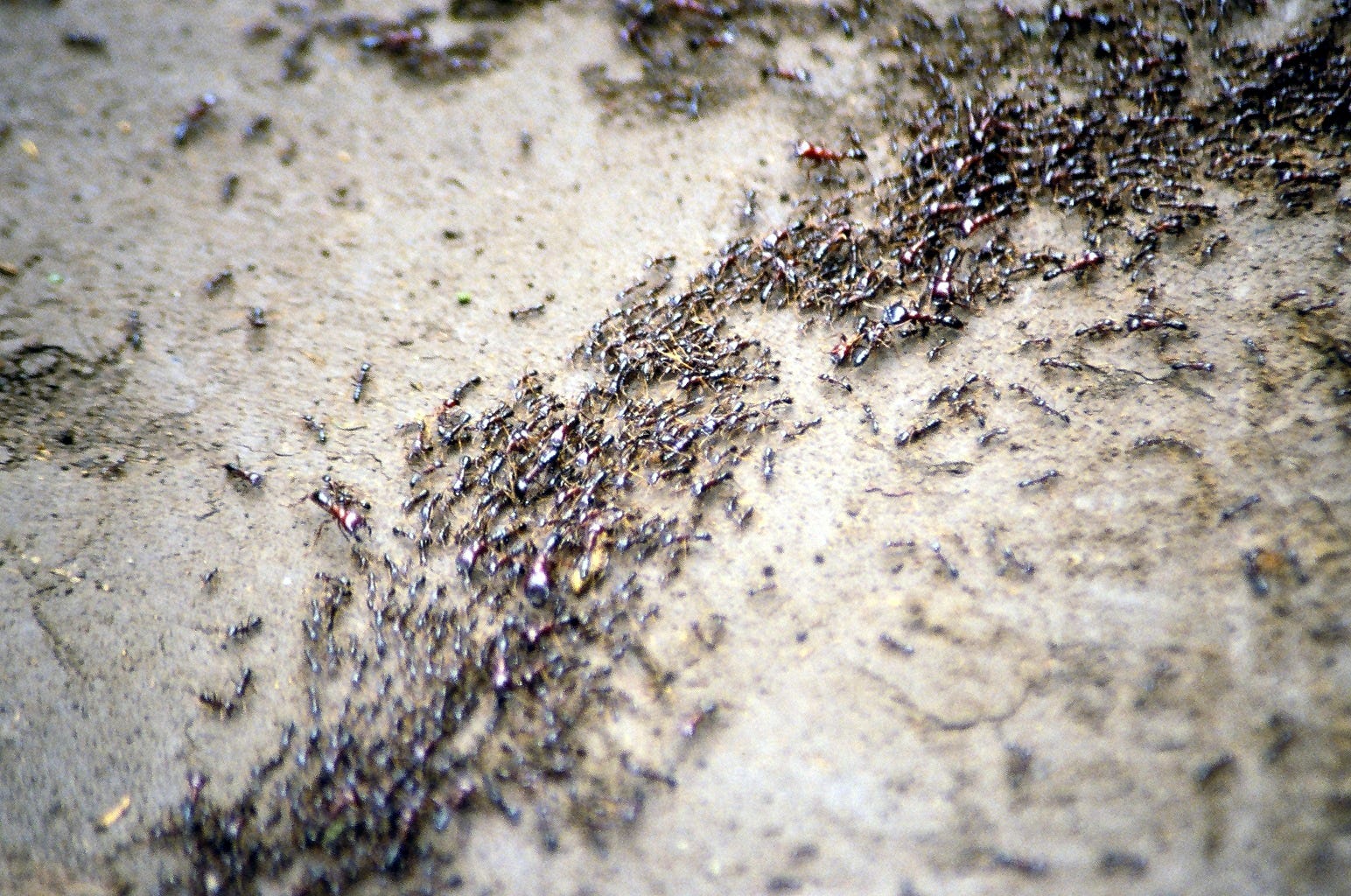
Ant paths built from pheromone traces. They are simple creatures, but together they form a complex structures. By Mehmet Karatay - Own work, CC BY SA 3.0
The purpose of the action is to tell the story of the collective
Now, if you want to face them, you will have to face them as a collective. You are no longer dealing with single atomisms. How can one know that? Somebody can aim that balloon at someone else and blow them away. That simple interactive motion creates the collective’s characteristics. At a collective level, the story of the collective force is the social pressure. One can tell a human army, a gang, or a group to ‘go kill’ or ‘go build a nation’ and the bunch will walk out together and act no longer as individuals, but as a collective. Source
And when you trace back what are these actors made of — for instance ants — there are only four known forces that cause the actions. You are nothing but an actor and the actions are not made by you, but by these internal forces, in case of a human walking, it is due to the electrical signals from the brain telling their leg muscles to contract. There are only four known forces: gravitational, electrical, strong nuclear, and weak nuclear forces. The purpose of the action is to tell the story of the collective.
We have the social instincts, herding behavior, representational heuristics to judge people quickly by their appearance. We utilize these ‘fast and frugal heuristics’ to pick us the best bunch, to find the most suitable collective in which we want to merge ourselves in and to be part of the collective’s characteristics, the greater structure to tell the greatest story. To achieve something that is not possible as an individual, to be a whole, to be part of a complex system, to transform into something that is more than a sum of its parts. Then we tell the story of the collective…
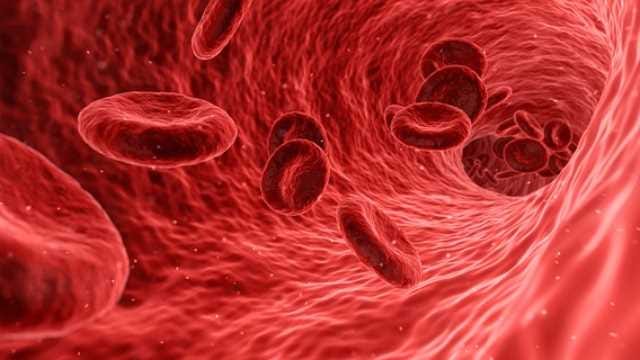
Blood stem cells communicate via cytokines, signalling proteins critical to the development of blood cells and the immune system.
You will have to face them as a collective
So if you abstract a bit and think that these actors are playing a game in a bounded space, it is fascinating to think that the whole world of ours is crowded with some primitive forces that are controlling a bunch of actors and transmitting information to each other, sending signals to group together, to act together and to tell the story of the collective. To form some great structure which bubbles up new qualities and a great deal of complexity and often it is something that we did not anticipate. Think about how our economy was born out of specialization, price signals, how big internet turned out to be, how cars changed the way these actors move around, these powerful things was born out of just some actors ‘banging into each other by pairs’

Think of Hitler as an actor, think of him signaling to the group of Germany ‘go kill’. Now it is a bunch acting no longer as individuals, but as a collective. It is a devastating story this collective told.
The actors are engaging in a game. This game, within any system, may be called ‘Banging into Each Other by Pairs’. The agents (forces) guarantee that the actors will bang into each other. A few major things are conserved during this game. The sum of the paired mass (or matter) is conserved, the sum of energy is conserved, the sum of momentum (or movement) is conserved, and the sum of the electric charge is conserved. Source
How you look, how you talk, it is just a design. The internal forces are the king in the process and you are part of something greater than you. The forces and the signaling process is the important part, what kind of story you are telling is the important part. You can be the pivotal signal that gathers together the collective or you can be part of someone else’s story, up to you.
07.02.2021
¶ Attention economics is fascinating
I don’t know, something about this whole information overload, advertising, ever growing human population and endless amount of voices to be heard and solutions to be offered, there’s something about it.
We live in times where speed of information flow is atleast 5x as compared to 90’s. This results in feedback loops, bandwagon effects, these phenomena of “winner takes it all”, where for instance one reddit post gains traffic, there’s an inclination of upvotes snowballing on this post. Meanwhile there’s tons of potentially more interesting and valuable posts being buried and gaining no attention.
It’s such an interesting thing as the valuations get distorted by so much, laws of supply and demand get damaged. We don’t have real tools to be able to screen the best ‘apples’ there are, so we need to resort to catchy headlines, pattern recognition, intuition… “fast and frugal heuristics”. Endless sea where it seems that the loudest and brightest forces will win.
It’s funny, reminds me of this south park clip https://youtu.be/wnwHPsj-Vsw
Stan: Dad, come on. We all get your point, but don’t you think you’re overdoing it?
Randy: You have to overdo it in today’s society, Stan. You can’t be nuanced and subtle anymore or else critics go, “Wow, what was the point of that?”
There’s just something about it, it’s like a game of forces that whoever transmits the loudest signal that yells “Listen to me! There’s a reward here to be reaped!” will win. And when this loud signal gets traffic, now the people around it act as a signaling force themselves further reinforcing the cluster and invoking the herding behavior. It is so fascinating!
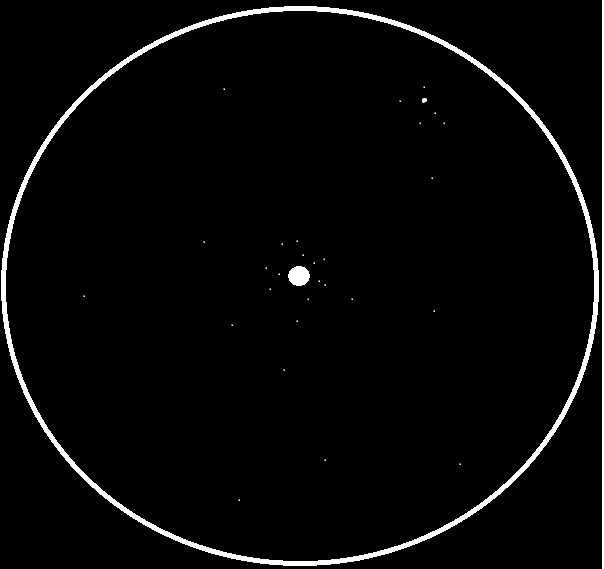
Game of forces where the greatest signal will gain traffic and will transform into a pivotal point where others gravitate towards.
06.02.2021
¶ Nurture small errors to avoid large failures
Really strong idea, lots of connections, very comforting idea also. In life, we inevitably face challenging choices and usually at the time of these choices our real nature shows up, who we are inside.
In bee kingdom, bees nurture small errors to avoid large failures. In face of a threat, they need to find a new nest and they do this by having just sufficient amount of scout bees doing a waggle dance around the new territory. Being able to make quick choices by quorum (having sufficient amount of bees) instead of consensus, they risk error but save themselves from larger structural collapse.
Ants deviate from the path once in a while which might seem inefficient but this small error rate can lead to discovery of new food sources. Great reward, small error.
In life, we have to accept small regrets in order to avoid larger ones. I have to sell my cat in order to make sure my dog heals fine who has serious illness and the cat brings unnecessary stress to her. It could be that the stress does not play a role and I regret selling her, but by going through with this, I avoid large regret of potentially hindering my dog’s healing process.
01.02.2021
¶ Repeated analogies expand concepts
Brain is a concept network, we work with categories, groups. Things that are connected and form a strong structure are what we work with the best. Your fabric about your best friend is immensely strong, a lot of instances, a lot of things about him/her grouped together under a concept “John” (or whatever your friend’s name is).
We build our concepts by taking several concepts, putting them together, putting a membrane around them and then, sort of miraculously the internal components sort of disappear and we’re left with just this new concept which is kind of like a black box. - Douglas Hofstadter
It’s like a spider web. When initially you start building it, it’s not very strong. But the fabric, the more instances and connections you make, the stronger it gets. The concept is born out of instances. Think of “animal”, the concept of “animal” is born out of birds, foxes, rabbits etc. These are things that share something or have some reason why they belong to the same category of “animal”.
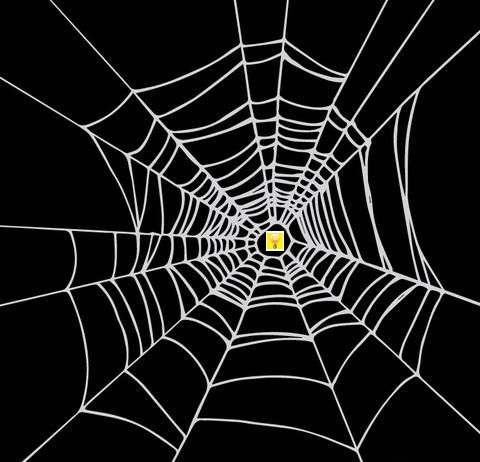
It reminds me of this image of some cult circle, the concept is alive as long as people (the instances) hold hands together around it. Sometimes it has only one instance but it’ll spread. This is a silly ass analogy and not exactly spot on, but the image below nails it, the ball is the concept. I like that these people don’t touch the ball, it just kinda is there. So the people are the instances (e.g. a rabbit, fox…) and the ball is the concept derived from these instances (e.g. animal).
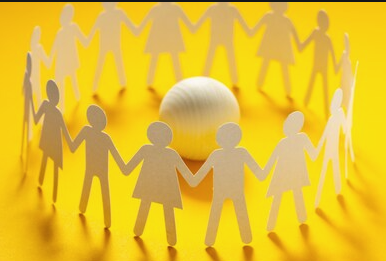
The concept might not even be mentioned by name, not every concept has a name. Yet it still is there as long as we have the instances categorized together. The concept is the higher order thing. The concept is derived from the instances, not the other way around and this is why it’s important that you connect things tightly together in categories. SRS can help immensely here.
There’s a reason why clozes don’t work for some people and why Q&A’s work better. There’s a reason why I feel like half of my collection is not applicable and is just vanished and it all boils down to connections/categories and the brain being a concept network. Short idea would be that, you might have the instances but you haven’t categorized them together, they’re not part of the same “spider web”. There’s a whole world to this but we need to experiment, observe and talk about this more.
Repeated analogies expand concepts - Douglas Hofstadter
This has absolutely crucial implications, it is a sentence from a great video Analogy as the core of cognition you should all watch.
With SRS, we can repeat these analogies in a scale that hasn’t been possible in the past. We can form concept groups effortlessly. We can create items to “repeat the analogies”. There’s so much to say about this but I don’t find a great moment to sit and write it down.
Feynmann technique, self explaining, making Q&A’s (the encoding process), ELI5, teaching to others , they are all in essence just a way of forming connections. Assembling the semantics and encoding the information in a way that it connects to the students current fabric. About categorizing things in a way that makes sense. So connections/categorizing whatever we call it is the higher order thing and all these “learning methods” are derived from it. They’re just variations which all follow the same principle of analogies/categories/connections. Even mnemonics is just forming an artificial category.
28.01.2021
¶ Back after a break from SuperMemo
Just a quick update. I had a short break from SuperMemo and it was very helpful. I did some soul searching, pondering about learning, goals and such.
What I realized that declarative learning without real direction dominated my day way too much. My previous post talks about this.
During my week off from SuperMemo I watched some SkillShare courses like presentation skills, discovered the world of UX/design and started progressing on a project of mine. It was about getting touch with “get hands dirty” way of learning and just generally, I think it was a healthy thing to have a break after such a heavy usage of SM for the past couple years. I spent more time outside of the world of learning also.
In conclusion, my “navigator” was adjusted and today my learning is more about goals, direction, purpose, skills, problems. It is about the real world and things that serve a purpose, about outcomes. I found a handy way to keep a purpose in learning with concept goals: https://youtu.be/plvVNEt2D54.
22.1.2021
¶ Learning should be a follower, not a leader
Practice reveals your weaknesses the best. It is the ultimate screener. It acts as a guiding signal to highlight the most fragile aspect to learn for.
For the past two years I have been hoping that if I (declaratively) learn a lot, somehow I turn to be more capable in processes and operating in the real world. Somehow a bunch of skills will follow if I just read a lot. That didn’t turn out to be the case and I feel stupid saying this out loud because every regular Joe around me knows this.
While I’m definitely smarter and time wasn’t exactly wasted in the past two years, but if you were to ask me: “What can you do better after studying with SuperMemo heavily for the past two years?”, I wouldn’t have much to show for concretely. This is not a flaw of SuperMemo (which is in extreme just a reading technique), but it was a flaw of my approach with it. You wouldn’t blame reading for not giving you the outcomes you want.
Now I do process information better, I can represent knowledge efficiently in my mind, I am smarter in a lot of domains. These all contribute to operating in the real world, but they are not any domain specific skills that allow me to make any meaningful contribution in the real world.
For some reason the order in my head was learn --> skills follow automatically, while in reality it should be practice --> learning follows –> skills develop. This is very evident but for some reason I was ignoring this. I don’t know why my learning process was so distorted. You wouldn’t study how muscles work before starting to bike.
This is one of the stronger ideas guiding me lately. I don’t remember where I read this:
Study just enough to take the next step.
So the activity you desire to do is the leader and learning is the follower, even if you were to do the learning before the execution. That is because the activity sets up the path for learning and practice gives signals about the areas to improve on. Human problems are the leader, our goals are the leader, skill I want to acquire is the leader.
I do realize that there is still a place for reading without combining it with practice, there is still a place for learning things upfront. This leads me to one of the bigger laws guiding me in life:
It’s always about a balance and it’s almost never the extreme.
From now on, I want to optimize for outcomes, whatever that means…
20.1.2021
¶ From semantic world to the sensory world
I finally decided to give SuperMemo a break and focus on working with my senses, body parts, with the physical me. I want to do something actual and utilize all my senses. For too long it’s been just SM and my mind. If you are tunnel visioning only on the “consuming the knowledge” part of learning, you are being highly inefficient. It’s never the extreme.
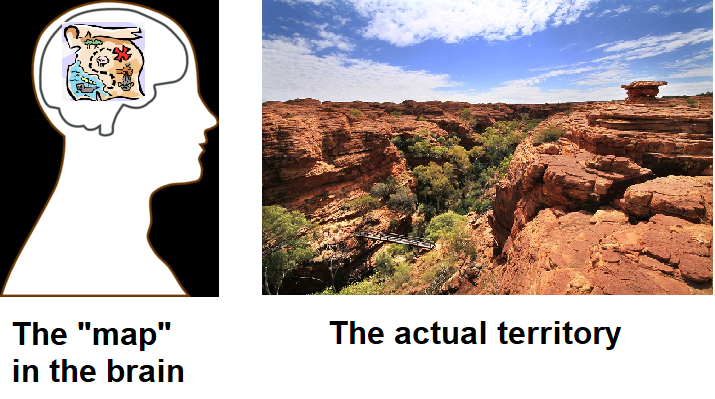
For years I’ve been polishing “the map” in my brain. Goal of the map is to help me operate in the real world. Operating better in the real world is why I am studying anything in the first place. I am studying to help my physical self navigate in the physical world, to produce something using my physical hands, interact with real people and to experience life. You probably see how one can feel lost if he tunnel visions only on improving the map instead of having frequent encounters with the actual territory. The map helps but the biggest learning and rewards lies in adapating, imitating and adjusting to the real thing.
Katona (1975) argued that social learning is simpler and more selective than individual learning. With social learning, people prefer short cuts and follow simplifying rules of thumb and routines. Imitation qualifies as a ‘fast and frugal heuristic’ in social situations (Gigerenzer & Goldstein 1996).
Learning by incremental reading and creating items is very low effort and fun. It is what I inclined towards every day. However, the moment the tool turns into an ultimate, it is a bad sign. Learning for the learning’s sake is very weak and won’t amount to much. On the other hand, having a thing you want to accomplish in the “sensory world” and learning for it makes a world difference — the efficiency of learning goes through the roof. Learning “just because” and for “stockpiling” knowledge — just in case — is weak.
My plan is to give a break to my unhealthy relationship with SuperMemo and to focus on skills and the real world. I will come back when I start seeing SuperMemo only as a tool and not the main thing I progress on. Alternatively, I will come back when I find a real goal and passion to work on and a need to resort to this magnificent tool.
The single most important principle of effective learning is that it has a strong sense of purpose and meaning. - Michael Nielsen
For now, I’ve been looking up things in SkillShare. I switched my focus to actual skills and will gather only the necessary knowledge for them, instead of gathering the knowledge upfront and hope the skills follow.
SuperMemo is probably the greatest software there is, but softwares are always secondary. Outcomes, skills and the real world should rule the process.
10.1.2021
¶ Virtual island of knowledge
This post is going to be updated (hopefully) frequently. Lacks source material and ideas!
This post is something I wanted to write quite some time ago. It is an analogy aimed to explain some nuances of incremental learning and to highlight the most important levers (macro aspects) we should focus on in learning. It started of an idea “from micro issues to macro issues”.
¶ Planting value
You want to plant only the best available resources on your island. Given enough time, everything in your island will be consumed or thrown away. You are what you eat. Material selection determines how your brain will look like in the upcoming years, so choose wisely!
Initiated 5.1.2020
¶ Mediocritization vs optimization
Never getting stuck
Something that has been affecting my world view lately is the idea of mediocritization vs optimization setting. I just wanted to share this nice series on that: Mediocratopia.
To be honest, I had this in my incremental reading queue for a while but I did just really hazy and quick skim of it and all that is left in my hands is the big idea of mediocritization vs optimization. In other words, I just took the general idea from the author and started noticing a lot of connections from this idea to many other domains.
I see these connections everywhere: minimum viable product, kaizen, incrementalism, premature optimization, satisficing vs maximizing, fundamental principles vs details, inertia… They’re not all the same, but revolve around this big idea of not getting stuck and keeping the momentum going. Not going for the “big homerun” but to consistently do small progress. Not to go for the “perfect” initially but let it emerge if the excellence is important enough. Not to focus on what it ought to be, but to focus on what you actually can do right now.
Mediocritization is about solving for survival first.
This is disruptive thinking in our world where people admire excellence, expertise, perfection, details and all that. Nobody wants to be mediocre. Wanting everything to be “just the greatest” can be paralyzing. Rather focus on getting the momentum going and worry about the excellence later.
4.1.2021
¶ Chasing success
I was watching a video of my favorite League of Legends streamer. I wanted to go back to my gaming days, see the environment. It felt crazy watching a video of LoL after not playing or watching any content in the past couple years. Hundreds of memories and connections were lightened up.
I am at a point in my life where I don’t have the one thing I do all day. It’s weird, I always had such activity. Learning is close, but you can’t really learn all day. Learning for the sake of learning is not efficient either. Learning is best guided by needs.
I had a lot of success in League but I failed too. When I watched the vid mentioned earlier, it stroke me: I didn’t love the game on every moment. I rage quitted a lot! I remember when things wouldn’t make sense to me and I felt like a failure, I hated the game. I would get so angry. On later years I ditched those poor habits, but these memories were delightful to me today. That’s because I falsely recalled that the journey was all fun and laughs. It was more like adrenaline, excitement, success and failure. It is lovely, I want that. There is no adrenaline in pure learning really. I loved winning!
I’ve been getting my feet wet on programming but I can’t find moments of success in that. Nobody likes losing. Reason I got so hooked into gaming because I found moments of success early on. Or maybe it was more about having fun initially and finding success later on, I can’t really tell. Just that I know having moments of success is critical to really love something. Maybe it’s self-evident but it’s an important angle to take. Go find those moments of success buddy. Chase the success!
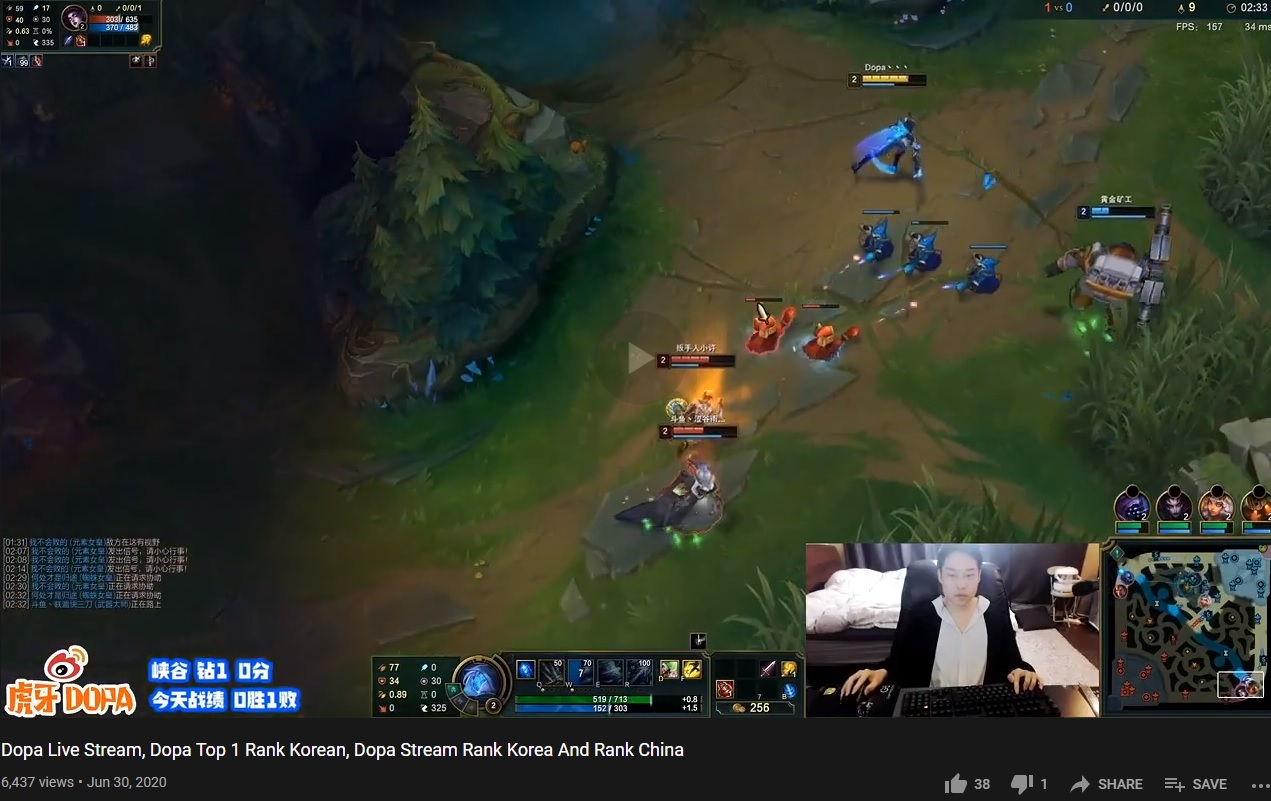
The moment in the video I realized that my gaming journey wasn’t all joy and laughs. In the video is one the best Korean solo queue players (atleast he was back in my days).
26.12.2020
¶ Connections matter
This post started out to be about applicability, output and my desire to take action in life, building and achieving things. It turned out to be more about connections and their profound importance in learning.
¶ Anything but applicable is useless
Frequently, you will find more benefit in memorizing the three best things you have learnt today than in memorizing a whole monothematic article to the last detail!
http://super-memory.com/help/il_full.htm
I am slowly reaching to this generalization. I found myself in spiral of jamming my head full of tens of different articles, then at the end of the day trace back and think, “man, that was pretty useless”. In contrast, some days I learn one GREAT thing and it has huge impact on my life. For instance, one day I googled about nicotine withdrawal symptoms and read this:
Withdrawal symptoms usually peak after 1–3 days and then decrease over a period of 3–4 weeks.
I used snuff for about 6 years and didn’t have strong urge to quit. However, after reading this sentence, something clicked. The connection between quitting and the symptoms was laid out for me, direct applicability. Problem of addiction was very evident and the solution was being 3 weeks without nicotine. I figured, alright 3 weeks, that’s a challenge. I’ll be off for 3 weeks and if I still crave snuff, I will buy some. After this seemingly random event and somewhat randomly googling this information, I’ve been off snuff for almost a year now. A very simple connection between a fact and a problem changed my life for the better. The information itself wasn’t anything new but the connection at that moment had a profound meaning to me.
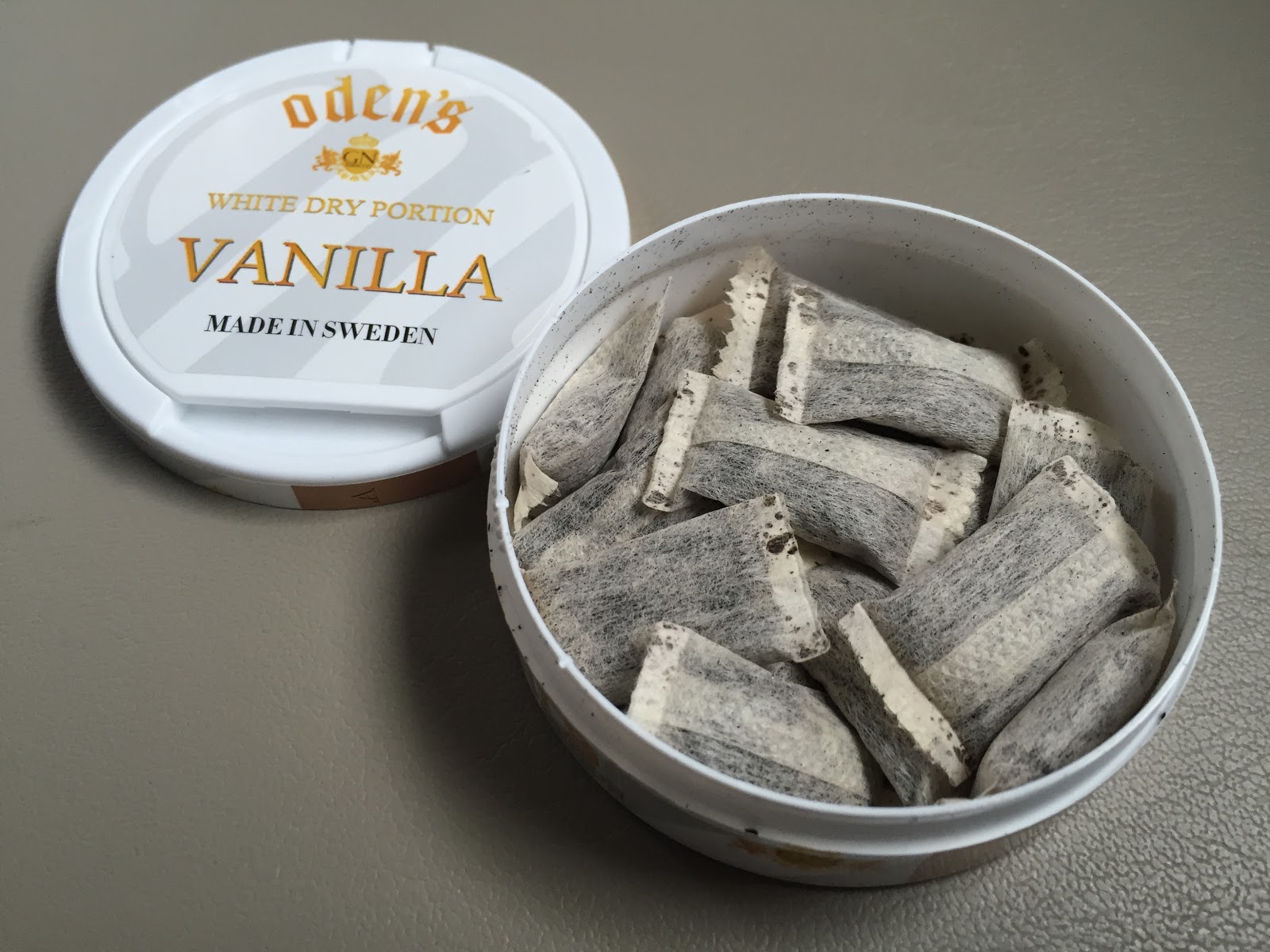
I used snuff for ~6 years. When I look at this image, I still can smell the stench of this product.
Now I’m not implying everything you learn needs to have such a great effect, but I’m implying everything should contribute directly or indirectly to your big goals or to your life in general. Applicability can be kinda broad term. It is applicable if it shapes your thinking. Almost everything shapes our thinking. I find it useful to think of applicability in terms of connections:
¶ If there is no connection, it is useless
You can’t remember what you can’t connect. - Elon Musk
I think this quote has huge implications. Imagine reading an article and you absolutely cannot connect it to anything in your life and you don’t plan to build on it. Not only it is asemantic, but what use it has? This has implications in a sense that the greater the number (or magnitude) of the connections, the more applicable the thing. You can read an article passively and miss all the potential connections you could make between the article and your life. This is maybe word twisting of things you probably already know, however I find it a nice way of thinking, a heuristic.
When you are reading an article, first thing you should do is to try to find the connections or form the connections. Connections can be found from anywhere! I think we can create applicability by forming connections. Connections need resemblances and properties of similar nature. I think being able to connect things like nobody else does is the root of creativity and genius. In contrast, if you are reading something that fundamentally is applicable and related to your life, but you don’t make the connection between the knowledge and your life, it is useless. This aligns with what I wrote in my article about knowledge being an asset.
Applicability can be created by forming connections.
Some authors make connections easy with their rich examples and metaphors. With some material you really need to concentrate to form the connection yourself.
If you can’t connect it, it’s useless. Connections can be found and formed from pretty much anything. Usefulness depends on the nature of the connection and nature of the resource.
If you backtrack to the Elon Musk quote in the beginning of this section, you see that this single quote formed multiple connections for me, reinforced some ideas and really touched my world. I viewed things differently after this single sentence. If on the other hand I were to read this quote passively and rush over it, I probably would have missed on the rewards. In the same fashion, you can turn even words from 5 year old into gold, if the nature of the connection allows it (for example, if the words from the kid sparks an unexpected connection that generates a fresh business idea).
¶ If you don’t use it, it is useless.
Simple as that, skills and knowledge that doesn’t contribute to anything are useless. If the skills are there but the execution is not, you wasted your time.
I am confident my goals and action will emerge with time, I know I will create something. It takes time and time worries me. Maybe this desperation and worry is crucial ingredient of the recipe for greatness? Maybe my worries of not achieving great things will paradoxically be the driving force to achieve great things. These driving forces are scarce I think.
To really love math you need to experience a beautiful coincidence of (1) super-interesting problem to solve and (2) super-effective solutions (known or found). This coincidence is rare and is more likely if you keep studying for long years without ever imposing the study on yourself by self-coercion. You know incremental reading so stay incremental and keep having fun. - Piotr Wozniak
I think this is a great quote. This “coincidence” of an interesting problem and a super-effective solution definitely is rare, however if some problem is in my mind every day — in my case starting to take action in life — I think the probablity of “collision” of the problem and the solution increases drastically.
If the problem worries and is on my mind all the time, it’s like having a gate open 24/7, waiting to connect a solution to the problem. Again, connections can be found anywhere and if the solution is to be found from a very unexpected place, suddenly and unexpectedly, it is helpful that I have my problem back in my mind there, ready to receive a solution. Otherwise that beautiful opportunity and coincidence will be missed, meaning that I don’t make a connection between the problem and the solution.
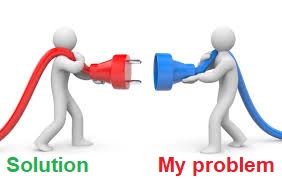
Connections matter.
One day someone mumbled in Discord voice chat about: “big output”… “output being big” or something like that. To this day, I don’t know who said it, I tried to ask around in Discord. I know it’s one of my friends because I heard it in the voice chat. I really liked the sound of “big output”, it translated to me as a question:
“How big can your output get?”
I just like the phrasing so much. I made “Circle of output” into my desktop background inspired by the phrase. How big can my output get? It instantly sparked an imaginary circle in my head. “Circle of output” that is. My circle of output is very small today. My goal is to enlarge my “circle of output” as much as possible in a lifetime. Bigger the impact, the larger the circle grows.
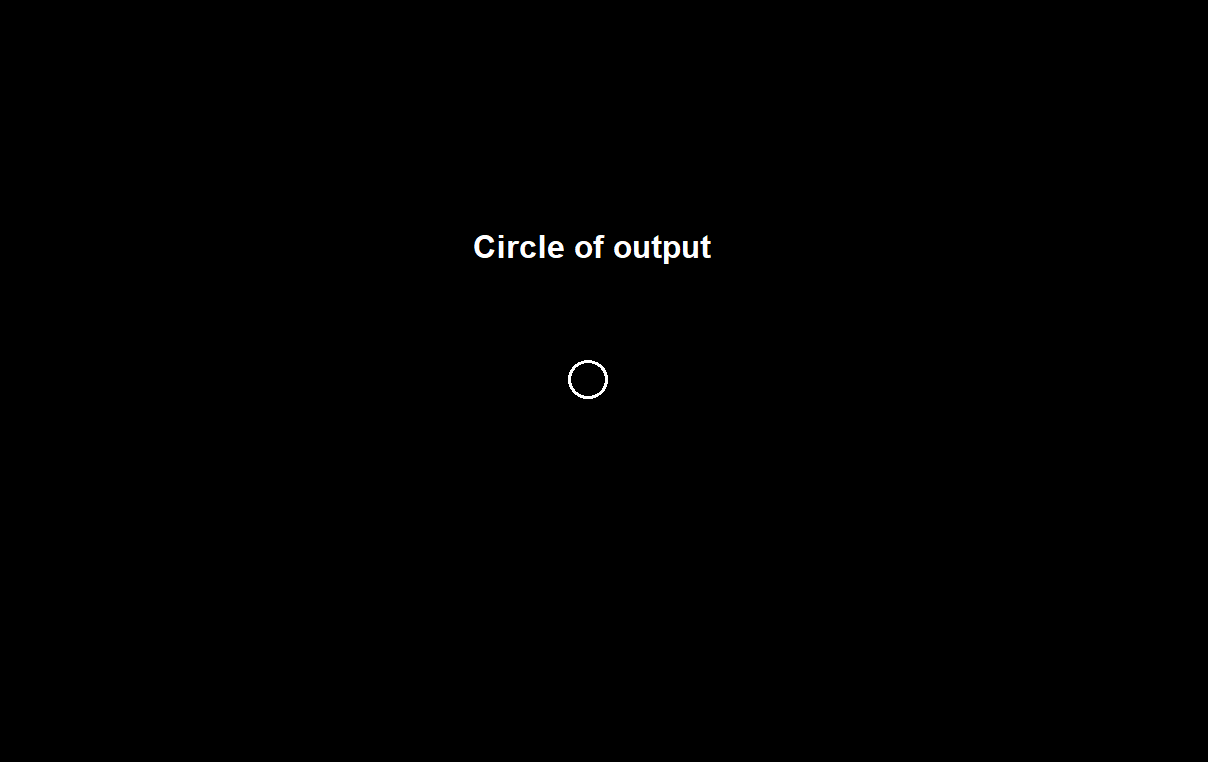
My desktop background
25.12.2020
¶ Learn drive in its purest form
You want to see learn drive in its purest form? Go observe someone choosing a netflix movie to watch. I do this all the time on my girlfriend. I see her skipping movies like a madman! She is RUTHLESS on jumping over movie which has “stupid looking cover”. No fear of missing out, nobody is stopping her. Once she told me to change Simpsons episode because the one on the TV looked lame. SHE SAW ONLY ONE FRAME. A SINGLE PAUSED FRAME. These kinds of heuristics are full of errors and leads to dismissing great things, but it’s the best we have in the endless stream of information. There is always more and better things. We have only limited attention and we need these quick filters.
Article quality matters in learning
In incremental reading, you will quickly develop skills needed to instantly differentiate between high quality articles and articles that are full of fluff and wasteful prose. You will indeed fish for catchy headlines, meaningful sections, minimum off-topic commentary, etc. Article quality will determine your ability to employ speed-reading, and to quickly prioritize your material. This has nothing to do with instant gratification obtained from social media, instant news, and other net distractions.
http://super-memory.org/archive/help16/il_full.htm
Strongly disagree here Woz. Took me over 1 year to develop atleast some sort of skills to differentiate the high quality articles and I still suck at it. Incremental reading wasn’t the big factor helping me to achieve atleast some sort of “sense of smell for value”. It was about when I stopped intervening my brain doing the job it does the best, that is quick filtering of information based on the inbuilt heuristics. I wouldn’t let these heuristics thrive. What I would do is let external factors, comparasions and thinking what culturally is viewed as noble thing to intervene my selection heuristics. This lead to piles of uninteresting material which would not stick to my memory.
What my girlfriend does with netflix seems shallow, but she is operating in environment with limited time, attention and information. She needs to use such heuristics to find the “optimal” movie in the shortest possible time. Sure my girlfriend can stop to read the descriptions, but that costs time and she has found it better method to do the first step filtering by the cover. She indeed is a notorious netflix flick killer but you know what? Without exception she enjoys what she watches. I bet you do too (when you are watching these movies alone). Atleast until you decide the garbage threshold is reached and you ditch the movie. You get a little “regret” and your inbuilt heuristics are adjusted just a little bit. You are more careful next time selecting similar looking movies.
Why I say selecting a netflix movie is the purest form of a learn drive is because we are selecting the movie only for ourselves. There is no cultural pressure, your parents are not intervening, nobody is telling you that this is more important than that. In other words, no external valuations. It’s just your internal valuations and the movies. Here we rely solely on our brains and the instincts. Our learn drive is guiding us 100%. Schooling does not affect me selecting a movie. I want the most enjoyable movie for the next couple hours and no external forces are going to affect that. Pure learn drive!
Next time you are selecting an article for learning, do it the same way you would select a netflix movie to watch. Just that this is an important movie that contributes to great things.
22.12.2020
¶ Dreams and passions
You think the productivity stems from your fine-tuned schedule and top notch tools but the real productivity stems from dreams and passions. The inspiration is what drives greatness, no tools or methods can replace that. I would give up SuperMemo for life if I would receive in return a great aspiration for something. Just because I know I wouldn’t need SM then. Everything would build on top of the aspiration no problem. SM would be helpful but the inner drive is more powerful tool than that.
Incremental video is great for building inspiration and dreams. Vivid and living things inspire us greatly.
22.12.2020
¶ New chair
I finally got a new chair. Years of poor posture, hours of abusing my back with poor chairs. Feels amazing to be able to sit straight and comfortably!
In the past, there was days when I was wondering to myself: “Why don’t I want to study? I am not feeling the same passion I usually have for learning, what’s up?” I thought my learn drive was dying!
The issue was my back! Nothing wrong with my learn drive, just that my physiological needs was overriding the call for learning. I was so glad that I was able to distinguish this. It can be actually quite difficult to notice whether it is a “boring learning material” issue in your SuperMemo collection or whether something else is screaming for your attention louder than the learn drive (e.g. poor sleep, stress or pain). The back pain wasn’t loud enough for me to instantly notice it, but loud enough to override my desire to learn.
My back needed more immediate attention than my learn drive did. When I noticed this, Maslow’s hierarchy of needs came instantly to my mind. It’s a hierarchy of motivation and suggests that people are motivated to fulfill basic needs before moving on to other, more advanced needs. I’ve heard of criticism on this model and I’m not sure how accurate it is but I think it’s still a good one to capture this idea I’m talking about.
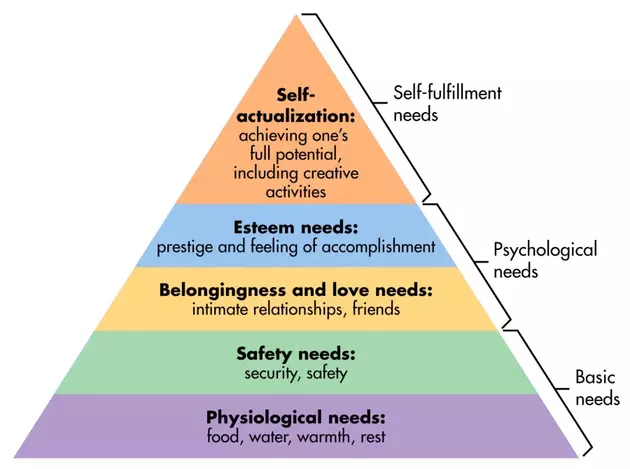
So in my case, physiological needs started to dominate my motivation. I was slow to notice this as the back pain wasn’t critical, but strong enough to override my “self-fulfillment needs”. So the lesson here is: if you have days of not “feeling it” for learning, make sure you have your basic needs covered before jumping to conclusion that something is wrong with your material or learn drive And in contrast (maybe more common pitfall), make sure your material selection is on point before blaming your lack of enthusiasm for learning on external factors like your PC setup.

Here’s the chair (or atleast it is pretty identical. This is image i got from web). The back pillow is a life saver!
20.12.2020
¶ Child learning to play
What has been the most dominant change in my way of thinking in the past year, must be how I perceive uncertainty. There are few big ideas which shaped up my thinking for good.
¶ Missile metaphor
The first idea which made me even acknowledge the importance of handling uncertainty in our lives is from Piotr Wozniak, which is Missile metaphor. It is about adaptability and goes like this:
Imagine a perfectly adaptable low flying missile that can learn to navigate terrain obstacles in search of a target. Like the human brain adapts to the environment, the missile adapts to the navigation in a difficult terrain. With each hour of flight, the missile will become more and more efficient in tackling unpredictable situations. However, if we try to control the missile manually, as it happens to brains at school, the adaptation may lead to poor control. Let’s imagine the missile flying into a long dark tunnel. Very soon, the missile will master the art of staying on course. In the tunnel, there is no complex control, and no advanced navigation necessary. After many years in the tunnel, when we release the missile back to the freedom of complex terrain, it will likely crash for it will have lost its navigation capacity through years of disuse. At school we do get some knowledge that may assist the learn drive in the process of recovery. However, this knowledge is comparable to taking on board a load of navigation manuals. After leaving the tunnel, the missile needs to navigate. Reading manuals with comprehension may come too late. Intelligent navigation requires fluency in making choices. That fluency does not directly come from textbook knowledge and requires hours or years of practice.
This metaphor had very big impact on me and I can’t pinpoint exactly why. Maybe the timing was just great as I had read a bit about economics of uncertainty and struck with a quote from a book called The Charisma Myth:
The ability to be comfortable with uncertainty and ambiguity turns out to be one of the strongest predictors of success in business.
Anyways, the ball about uncertainty started rolling and I became very intrigued about the whole thing. It made sense on so many levels in my life. Back then I also found Learning to navigate uncertainty and complexity which further reinforced the idea.
Some time passed and I started digging through a concept called “exploration” in my collection, which consists of tons of links and topics I am not familiar with. All of these have 100% priority and I explore the concept from time to time. Anyways, then I came across this very powerful idea…
¶ Cynefin Framework
Cynefin Framework, sometimes called “sense-making device” is a framework used to aid decision-making. It has five domains: obvious, complicated, complex, chaotic, and disorder. It helps managers to identify how they perceive situations and make sense of their own and other people’s behaviour.
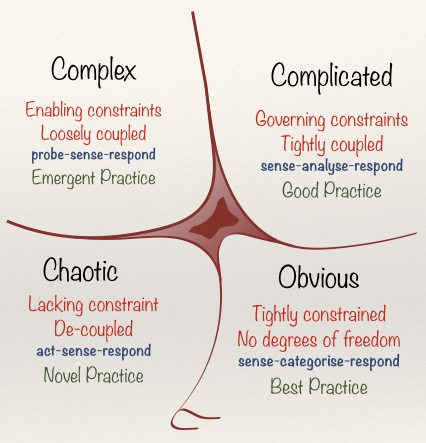
Now the framework itself didn’t mean much to me (though it seemed interesting!). What had very powerful impact on me was this neat illustration of Cynefin framework by Edwin Stoop:
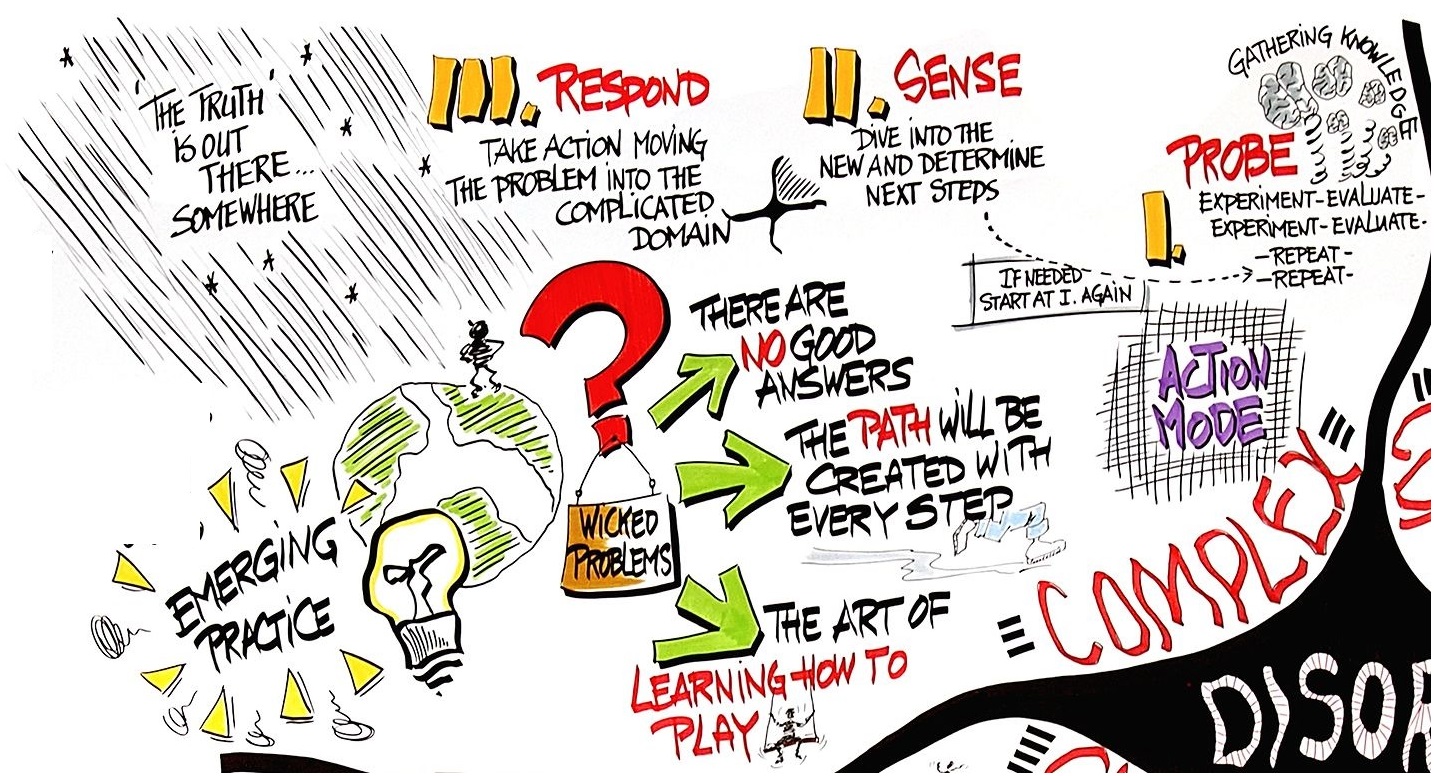
I cropped the image, but you can view the original here.
What was very powerful in this image was “the art of learning how to play”. This had HUGE implications for me! Child who never kicked a football approaches it, kicks it, gets feedback and adjusts! He has no idea what to do and no idea what will happen when he does something! Yet he bravely approaches the unknown, sees what happens, gets feedback and goes from there. No step-by-step instructions, no manuals, no teachers, just uncertainty and a kid!
There is just something very beautiful about this, after being schooled for so many years and everything I knew revolved around direct instructions from teachers and parents. This is so impactful because it fought (and won) my past life strategy how I should plan everything and how I should always have step-by-step guidelines and profound reasoning why I should do something and how I should go about doing it, when in reality in some domains there is so much uncertainty, it is very poor strategy to work with your prior knowledge. Way better approach is to lean towards darkness, see what it is like there and slowly start revealing your surroundings and adapt to it.
The path will be created with every step. The truth is out there… somewhere!
Huge implications… I definitely am more comfortable with uncertainty these days and approach it with enthusiasm rather than getting anxious of not knowing what to do next!
¶ Civilization metaphor
The last idea is some synthesis I produced from what I had learn. All this reminded me of a game I used to play called “Civilization”.
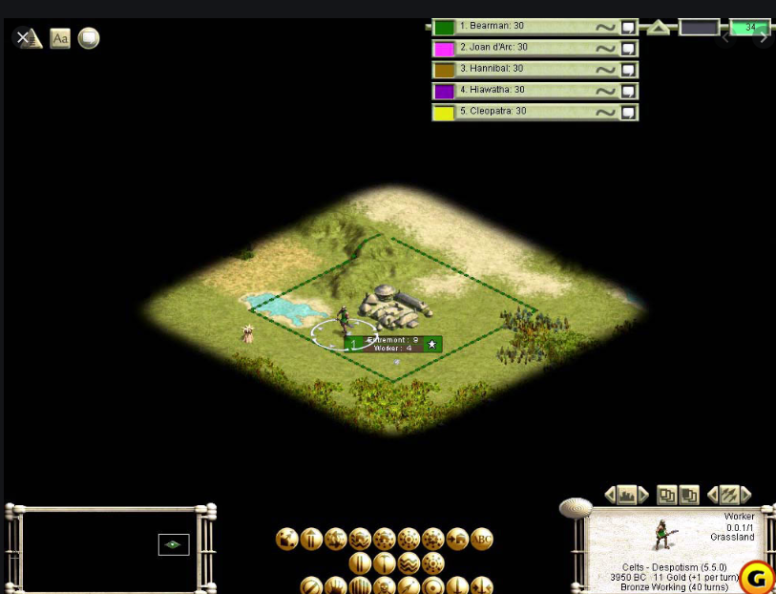
In Civilization you start with a dark map. You know nothing about your surroundings. Sounds familiar? It can be generalized to so many domains! In Civilization your goal is to build some huge empire and become all powerful. You do this by initially exploring your surroundings, finding resources, building cities and armies. Any location you haven’t explored is dark. This has great implications for life.
Can you see how trying to work with reasoning and your prior knowledge is poor strategy when starting in initially dark place? “Where should I explore, what should I do, how do I plan this”. These all are poor strategies! There is no good strategy (the strategy will emerge after the initial steps). You have absolutely no idea of your surroundings, so your best bet is to bravely throw dart somewhere, start exploring and gather intelligence of your surroundings. Lean towards darkness, get feedback and adjust. If you don’t find anything in North, go South!
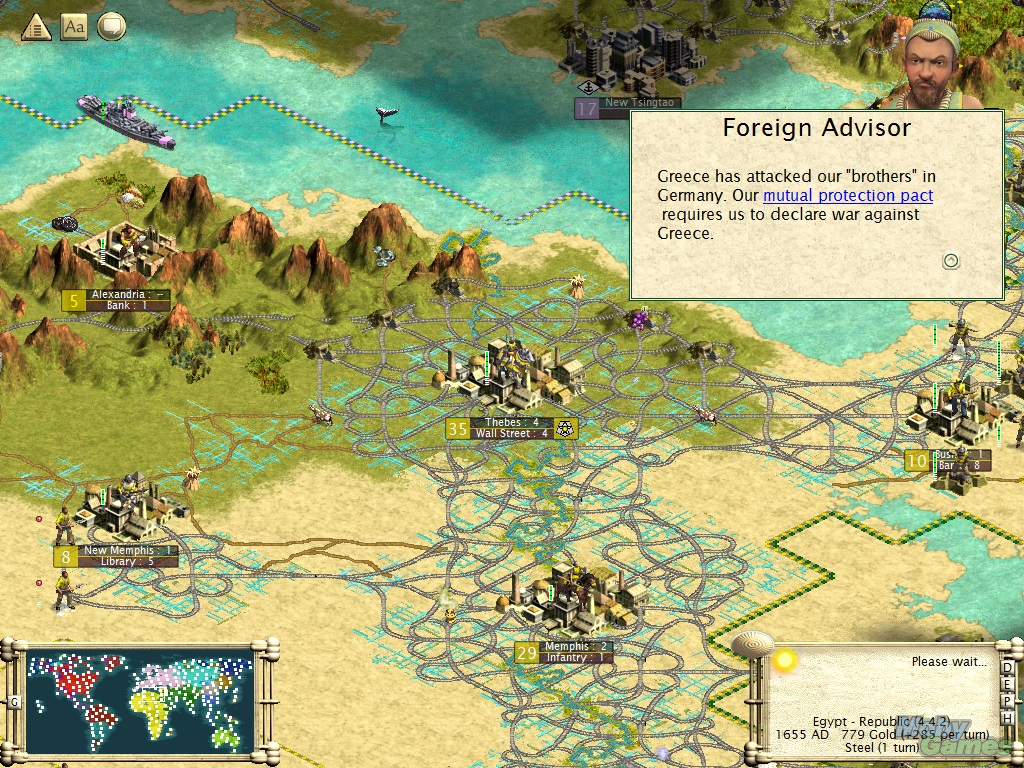
With time, the map starts to brighten up. It is so much easier to work when you know your surroundings, tools and resources. One road connects to another, things start to make sense. We wouldn’t have this civilization if we didn’t bravely work with the uncertain.
Knowing that “this thing exists” is the starting point of changing your life for the better. Same quality thought is being aware of what you “can do”. Awareness is the key to everything.
Imagine it, if I didn’t know that “SuperMemo exists”, I wouldn’t love learning today. If I didn’t know that “I can get into university”, I wouldn’t be in university today. This sounds silly, but I actually wasn’t aware that I could apply to university with papers from vocational school I went to. I thought you could do that only with papers from high school. The day I found out I actually have the chance to apply, the seed was planted, and the path was adjusted towards great learning (finding SuperMemo).
This all goes align with navigating uncertainty, going towards darkness, finding what is out there, revealing the unknown, gathering the tools and knowledge and discovering your capabilities. This is the essence of life and it is such a beautiful idea!
¶ Anecdote about “revealing the map”
I was talking with my friend about starting a start-up. We were coming up with different ideas and one of these was a software idea. My friend was streaming for me in Discord and sketching out ideas on paint. We settled with this software that works like slot machine for stocks.
What puzzled me was that my friend who NEVER have programmed anything, started thinking: “how would this technically work”. He was thinking how difficult it would be to write this program, when he does not know what simple “hello world” program requires. He started thinking and fiddling in paint about these technical parts and assessing how difficult/easy it would be (again, no idea about programming at all). And somehow he seemed to start thinking that maybe it would be too difficult, all while sitting on his computer chair, working in paint with nothing but his prior knowledge.
If he wanted to do it, there is no good strategy (the strategy will emerge after the initial steps) and his prior knowledge will be of little help. What he needs to do is start investigating, gather data, see how it looks out there, reveal the map and start working on it.
You could argue “he could analytically start thinking steps, planning or thinking the research through”, however premise is that he knows nothing about it, so these all are inferior options to just acting and “revealing the surroundings”. He should start gathering information (googling about similar projects, basics of programming or whatever). The strategies don’t matter all that much and his prior knowledge will be of little use (given he doesn’t know reliable sites related to the domain and it is a whole new thing).
It will always be superior to start “revealing your surroundings” in these situations. Maybe “child learning to play” is a tad extreme, but it’s inspirational to me anyways and helps me focus on “revealing” what is out there, instead of talking myself to corner with prior knowledge and strategies, when I know of so little about the new domain.
18.12.2020
¶ Applicability of knowledge
I just watched a video for stretching lower back, did the exercise and I feel AMAZING. This made me think about a piece from the incremental learning manual: “An item related to a Heimlich manoeuvre can save the life of a family member”.
In our community, we often emphasize that the applicability of knowledge must be the top criteria in selecting material for consumption, but this experience once again highlighted the importance of it for me. I can read a whole book about elementary physics and not know much more about the world than I already did from my daily observations (e.g., how trees behave when there is wind). On the other hand, I can watch a 2-minute video about stretching and improve my life INSTANTLY and be able to do so in the future too.
For example, a sentence written in French “SuperMemo vous aide a mémoriser et apprendre diverses informations comme une langue, des chiffres, etc.” may be of nearly zero value for someone who does not know French. At the same time, an item related to a Heimlich manoeuvre can save the life of a family member. We know that the expected payoff equals the value of the payoff multiplied by its probability. Therefore, the low probability of a family member choking and the probability of actual successful application of the manoeuvre make the value of “Heimlich item” a fraction of the value of the human life. At the same time, even minor errors in medical knowledge of a physician can actually cost somebody’s life and carry substantial negative value!
https://super-memory.com/help/il_full.htm
Frequently, you will find more benefit in memorizing the three best things you have learnt today than in memorizing a whole monothematic article to the last detail!"
https://super-memory.com/help/il_full.htm
Btw, here is the link for the stretch exercise for those interested
http://youtu.be/3NlugMEihG8
18.12.2020